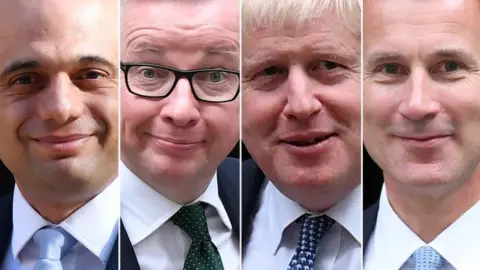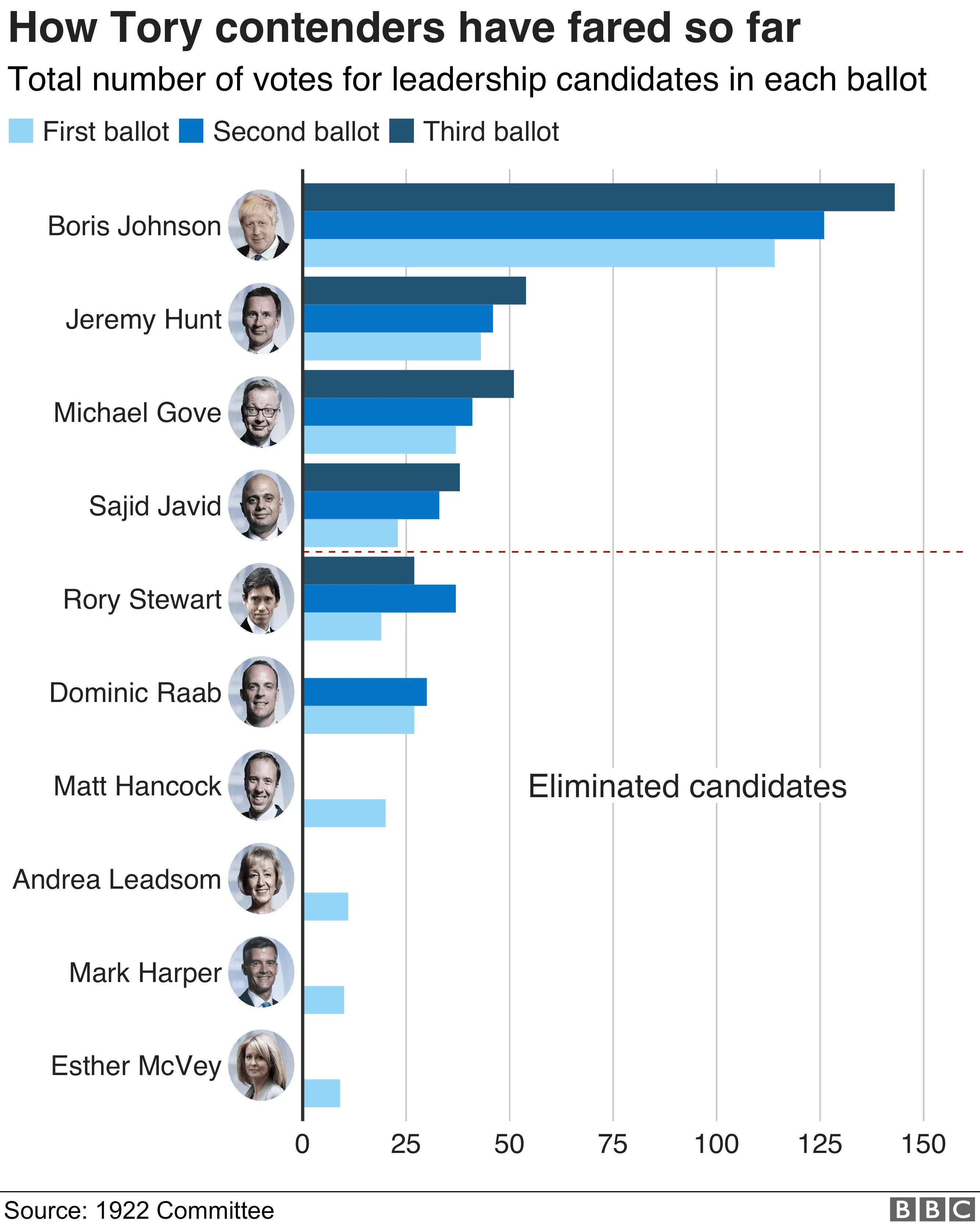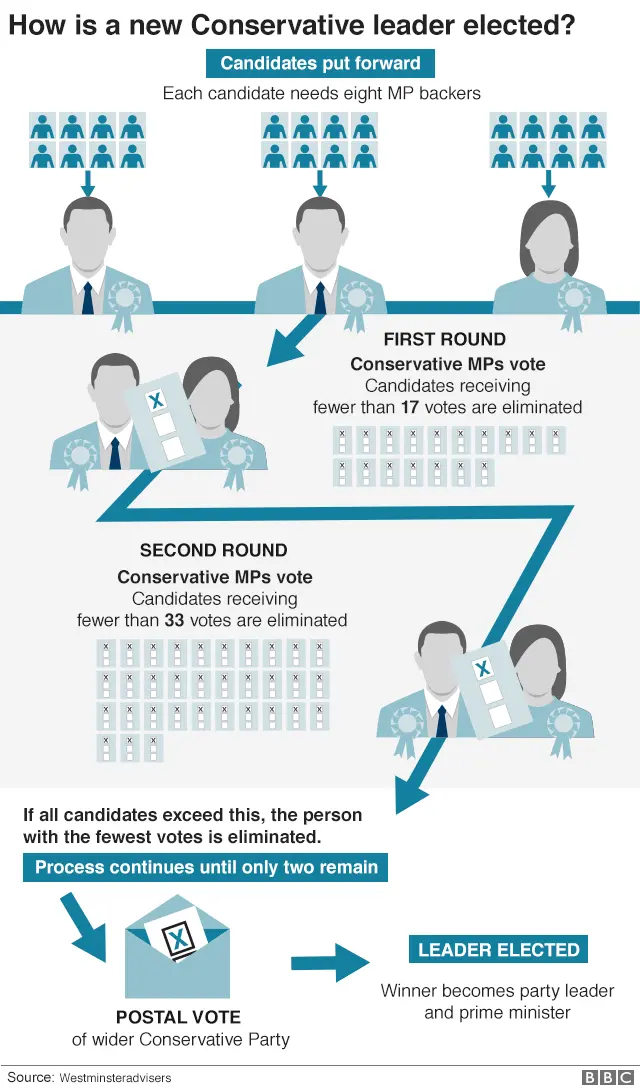Conservative leadership: MPs await results of fourth vote
 AFP
AFPTory MPs have voted in the latest stage of their leadership race, with the man who comes last set to be eliminated.
The remaining field of four candidates will be whittled down to three in a secret ballot. The result are expected at about 13:00 BST.
There will then be a further vote to select the final two, one of whom will be elected leader by party members.
Boris Johnson topped Wednesday's third ballot with 143 votes, ahead of Jeremy Hunt, Michael Gove and Sajid Javid.
International Development Secretary Rory Stewart was knocked out of the contest on Wednesday evening, after he secured the backing of just 27 Tory MPs.
Mr Johnson is almost certain to make the run-off of 160,000 or so Conservative members who will elect the next Tory leader - and prime minister - in a postal ballot, starting next week.
His campaign to be prime minister received an endorsement from Evening Standard editor and former Chancellor George Osborne.
An editorial for the paper argued Mr Johnson had "the best shot" at uniting the government, getting the country out of "the Brexit mess" and help Britain feel "good about itself again".
Mr Johnson told the paper: "It is time we had some excitement back into politics" but added that "there's also quite a serious job of work to be done".
But the race to join the former foreign secretary in the final two remains too close to call.
Mr Hunt, the foreign secretary, led Mr Gove by just three votes in the third round of voting, with 54 and 51 supporters respectively.
Home Secretary Sajid Javid was in fourth place with 38 votes.
He has insisted he will not pull out of the race and it is all to play for. His camp is hoping to attract backers of Mr Stewart.
Mr Javid's campaign manager, Tory MP Robert Halfon, said the home secretary was "the outsider" but that he had support from across the party and was also picking up votes from former supporters of other candidates.
Mr Stewart said he "will not be declaring for anyone" on Thursday, but will be voting later.
The BBC's political editor Laura Kuenssberg said there were all kinds of possibilities regarding potential alliances and pacts between the candidates chasing Mr Johnson.
Work and Pensions Secretary Amber Rudd - who backs Mr Hunt - told BBC Radio 4's Today programme she was not "resigned" to Mr Johnson becoming prime minister.
"We haven't seen much of Boris," she said, adding that there were 16 hustings coming up over three weeks, with plenty of opportunities for members to decide who would be the best prime minister and "not just a good campaigner".
Former Brexit Secretary David Davis, who is now backing Mr Johnson after initially supporting eliminated candidate Dominic Raab, told Today Mr Johnson would be a "very good prime minister".
He said he was lending his support as Mr Johnson had assured him the UK would leave the EU on 31 October under his premiership.
Mr Davis also defended Mr Johnson's championing as London mayor of the Garden Bridge project, which eventually collapsed despite £43m of public investment, saying it was a "single mistake".

Battle is 'fluid and real'

After nine days and three rounds, it's almost decision time.
Tory MPs will vote, and vote again - perhaps up to late on Thursday night - until there are only two men left.
Barring some bizarre implosion, one of them is certain to be Boris Johnson - the politician who despite the wilful rollercoaster, has come determinedly back from the political brink.
For many months he was down, but evidently, never truly out. The contest to take him on is fluid and real.

'Twists and turns'
The leadership campaign has, so far, been dominated by Brexit - with the candidates criticising each others' plans for getting the UK out of the EU by the 31 October deadline.
Mr Hunt told LBC he believed the EU was prepared to re-open the agreement they reached with Theresa May - rejected three times by MPs - if they found themselves dealing with the "kind of person they could do business with".


Mr Hunt said the current withdrawal agreement containing the controversial backstop - an insurance policy to maintain an open Irish border - was "dead", and could not get through Parliament.
But he said he was confident the EU would listen to the UK if it came up with technological alternatives to the backstop, which they knew commanded the support of MPs.
"If you give them the kind of prime minister they think they can do business with, who is going to be fair and tough, then my reading of this is they do want to solve this," he said.

The view from the EU
It is "unavoidable" that Brexit in any form will "diminish" the UK, Dutch prime minister Mark Rutte has told BBC Radio 4's Today programme.
He said there was "no point" in having another extension to the Brexit deadline, currently 31 October, if "traditional talks" were staying the same.
There will be no renegotiation of the withdrawal agreement, but the UK and the EU could "look together at the political declaration", he said.
And changes could be made to this if the UK tells the EU how it wants to deal with the Irish border.
"I hate no-deal Brexit from every angle," Mr Rutte said, adding that it would have a "huge impact" on the UK.
He also said no to a transition period without a withdrawal agreement, saying: "Hard Brexit is hard Brexit, I don't see how you can sweeten it."

Mr Gove told LBC there were always "twists and turns" in a leadership race, but he was "hopeful" of making it to the final two, given his breadth of support amongst Tory MPs.
While he had not spoken to Mr Stewart since his elimination, he said "having his support would be brilliant".


Although Mr Johnson had "formidable qualities", Mr Gove said he felt he would be a better prime minister than his former cabinet colleague and fellow Brexiteer.
"Boris Johnson has communication skills a plenty but when it comes to a forensic examination of Jeremy Corbyn's programme, and a demolition of him in the House of Commons, I believe I would be better equipped than any of the other candidates."
